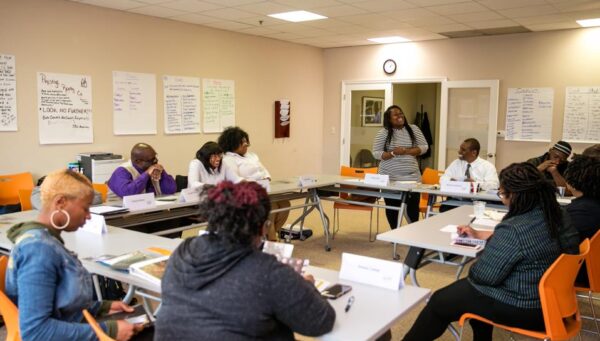WASHINGTON, D.C. JULY 9, 2025—Today, the Social Finance Institute launched Workforce Realigned, Volume II. The publication is a collection of 21 case studies—authored by 35 leading policymakers, employers, educators, and practitioners—that offer a range of options for transforming how workforce development programs are designed, financed, and evaluated to better address the talent demands of the 21st-century economy.
In collaboration with the Federal Reserve Banks of Atlanta, Chicago, Philadelphia, and Richmond, the new volume explores innovative, outcomes-driven initiatives that improve opportunities for workers and address talent needs by fostering collaboration among training providers, governments, and employers. It also highlights new financing tools—such as pay-for success contracts and employer-led training—that prioritize employment outcomes, sustainable career pathways, and measurable skills development over traditional enrollment-based funding.
“In a rapidly evolving economy, we need workforce development solutions that can adapt and innovate to meet emerging opportunities challenges,” said Tracy Palandjian, CEO and Co-Founder of Social Finance. “Workforce Realigned, Volume II highlights how new workforce approaches can lead to better jobs and higher wages for workers, while strengthening talent pipelines for employers, and driving broader economic growth.”
“These shared accountability models represent the next generation of workforce development—breaking down silos, realigning incentives, and redistributing financial risk to invest in skills training that strengthens our economy,” said Karen Anderson, Managing Director of the Social Finance Institute. “By showcasing initiatives from across the U.S., this volume provides practitioners and policymakers with proven approaches to enhance opportunities for workers while meeting the talent demands of today’s economy.”
The book is available for free on its website: www.workforcerealigned.org, including a summary overview of each chapter and supplementary resources about the authors, upcoming events, and more. The book features case studies by authors in the following areas:
Earn & Learn Models:
- Can Pay for Success Scale Apprenticeships in the U.S.? by John Colborn, Executive Director, Apprenticeships for America; Harry Leech, Director of Strategy, Apprenticeships for America; and Deniz Nemli, Research & Communications Coordinator, Apprenticeships for America
- Smoothing the Path to a Family-Sustaining Career: Supporting Apprenticeships in Rural America by Julianne Dunn, Senior Program Officer, Rural LISC
- A Promising Model of Financial Risk-Sharing: The AARP Foundation Upskilling Initiative by Claire Casey, President, AARP Foundation
- The Hire-Train-Deploy Model: Rethinking Entry-Level Workforce Development in the Age of AI by Ryan Craig, Managing Director, Achieve Partners; and Jeremy Bernard-Sasges, Analyst, Achieve Partners
- Building a Self-Sustaining Staffing Agency for the Social Sector by Amelia Nickerson, CEO, First Step Staffing
Repayment Models to Recycle Capital:
- Innovative Financing for Infrastructure and Energy Job Training: Partnerships to Expand Economic Mobility, Competitiveness, and Sustainability by Xavier de Souza Briggs, Senior Fellow, Brookings Metro; and Tracy Palandjian, CEO and Co-Founder, Social Finance
- The ReNEW Fund: Building and Sustaining a Talent Pipeline for Nurses by Scott Pulsipher, President, Western Governors University; and Jeannie Virden, Chief People Officer, Central Health
- Google Career Certificates Fund: Investing in the Next Generation of Tech Workers by Lisa Gevelber, Founder, Grow with Google
- Paying It Forward in New Jersey: Designing and Implementing a New Fund for Talent Development by Tara Colton, Chief Economic Security Officer, New Jersey Economic Development Authority
Outcomes Funds & Pay for Success:
- The Promise of Outcomes Funds for Economic Mobility by Sir Ronald Cohen, Co-founder and President, GSG Impact
- Buying Outcomes: Lessons from the Past by Paul Ryan, former U.S. House Speaker (R-WI) and President, American Idea Foundation
- Strengthening Families’ Economic Wellbeing: Lessons from Connecticut’s Outcomes Rate Card by Beth Bye, Commissioner, Connecticut Office of Early Childhood
- Governing for Results: Case Studies from Massachusetts by Charlie Baker, former Governor of Massachusetts; James Peyser, former Massachusetts Secretary of Education; Rosalin Acosta, former Massachusetts Secretary of Labor & Workforce Development; and Mark Attia, former Massachusetts Assistant Secretary for Finance & Performance Management
- A Good Job at the End of Training: Rhode Island’s Outcomes-Focused Approach to Workforce Development by Gina Raimondo, former Governor of Rhode Island and former U.S. Secretary of Commerce; and Jeffrey Liebman, Professor, Harvard Kennedy School
- Employer Pay-for-Success: Taking the Risk Out of Workforce Partnerships in Philadelphia by Ashley Putnam, Director of the Economic Growth & Mobility Project, Federal Reserve Bank of Philadelphia; Tyrone Hampton, Jr., Director of Workforce Partnerships, Philadelphia Works; and Cait Garozzo, Executive Director, The Skills Initiative
Community & Technical College Innovation:
- Subsidizing Success, Not Enrollment: The Texas State Technical College Funding Model by Michael Bettersworth, Senior Vice Chancellor and Chief Marketing Officer, Texas State Technical College
- FastForwardVA: Connecting Workers, Employers, and Skills by David Doré, Chancellor, Virgina Community College System
- Improving Outcomes (Measurement): A New Survey of Community College Success by Tom Barkin, President and CEO, Federal Reserve Bank of Richmond; Laura Ullrich, former Regional Economist and Senior Manager, Federal Reserve Bank of Richmond
Trends & Opportunities:
- Paths to Providing Supports for Women’s Participation in Workforce Development Programs by Kate Bahn, Chief Economist and Senior Vice President of Research, Institute for Women’s Policy Research
- Worker and Learner Perspectives: Insights from Participants in Outcomes-Based Training Programs by Tiffani Horton, Senior Advisor on Community & Economic Development, Federal Reserve Bank of Atlanta; and Sarah Miller, Principal Advisor on Community & Economic Development, Federal Reserve Bank of Atlanta
- Human Capital, Automation, and Artificial Intelligence: Post-COVID-19 Integration by Kristen Broady, Director of the Economic Mobility Project, Federal Reserve Bank of Chicago
This new volume builds on the 2021 publication of Workforce Realigned, Volume I, by Social Finance in collaboration with the Federal Reserve Banks of Atlanta and Philadelphia.
On Thursday, July 17, the Social Finance Institute will host a launch event for Workforce Realigned, Volume II. The event will feature contributing authors through engaging panel discussions, spotlighting strategies and insights from leading workforce initiatives. View the agenda and register here.
###
About the Social Finance Institute
Launched in 2024, the Social Finance Institute is a first-of-its-kind platform designed to bridge theory and practice for market leaders, policymakers, and practitioners looking to implement and scale outcomes-based solutions. We aim to build the field and change systems through applied research and publications, communities of practice, and educational outreach. The Institute is an initiative of the national nonprofit Social Finance, guided by an Advisory Council of practitioners, business leaders, and policy experts. Learn more at socialfinanceinstitute.org.


